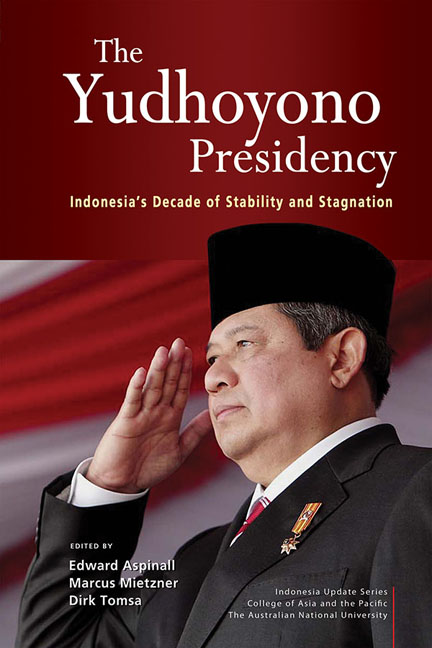Book contents
- Frontmatter
- Contents
- Tables and figures
- Contributors
- Acknowledgments
- Glossary
- 1 The moderating president: Yudhoyono's decade in power
- 2 Prologue Yudhoyono's legacy: an insider's view
- PART 1 PERSONAL, COMPARATIVE AND INTERNATIONAL PERSPECTIVES
- PART 2 INSTITUTIONS, POLITICS AND SECURITY
- PART 3 GENDER, HUMAN RIGHTS AND ENVIRONMENT
- PART 4 THE ECONOMY AND SOCIAL POLICIES
- Index
- Miscellaneous Endmatter
1 - The moderating president: Yudhoyono's decade in power
Published online by Cambridge University Press: 19 May 2017
- Frontmatter
- Contents
- Tables and figures
- Contributors
- Acknowledgments
- Glossary
- 1 The moderating president: Yudhoyono's decade in power
- 2 Prologue Yudhoyono's legacy: an insider's view
- PART 1 PERSONAL, COMPARATIVE AND INTERNATIONAL PERSPECTIVES
- PART 2 INSTITUTIONS, POLITICS AND SECURITY
- PART 3 GENDER, HUMAN RIGHTS AND ENVIRONMENT
- PART 4 THE ECONOMY AND SOCIAL POLICIES
- Index
- Miscellaneous Endmatter
Summary
Susilo Bambang Yudhoyono presided over a critical period in Indonesia's modern history. During his decade in power, between 2004 and 2014, Indonesia's new democracy stabilised. Not only was Yudhoyono able to serve out his two full terms without experiencing any major political crisis or disruption to his government, but he also managed to implement democratic reforms initiated before he took office, such as popular elections of heads of provinces, cities and districts. Democratic elections were generally well run and the military kept out of day-to-day political affairs. The new Corruption Eradication Commission (Komisi Pemberantasan Korupsi, KPK) began to make inroads into the elite-level corruption that had bedevilled the country. While the 1998–2004 transition from the authoritarian rule of long-time president Suharto had been marked by significant ethnic, religious and other forms of violent conflict, the Yudhoyono years were far more peaceful, symbolised by the signing of the Aceh peace agreement in 2005. Indonesia maintained an impressive rate of economic growth averaging over 5 per cent, paid off the debts it had accrued to the International Monetary Fund during the 1997–98 economic crisis and succeeded in reducing the official poverty rate from 16.7 per cent in 2004 to 11.5 per cent in 2013. Moreover, it seemed to be playing a major role in world affairs, with the country gaining entry to the G20 club of major economies, and with the president touting Indonesia's international leadership role as a modern Muslim democracy.
However, Yudhoyono's record of success was far from being unadulterated. As we shall show in this chapter and throughout this book, every time the president or his supporters pointed to an achievement, his critics were ready to identify a contradiction, failing or shortcoming. With regard to his democratic record, for example, some observers have characterised the Yudhoyono period as being marked by stagnation rather than progress (Tomsa 2010; Fealy 2011; Mietzner 2012; McRae 2013). In the economic field, Yudhoyono was widely criticised for being reluctant to push through major structural reforms (such as the full elimination of costly fuel subsidies) that would have freed funds for much-needed investments in infrastructure, education and other fields.
- Type
- Chapter
- Information
- The Yudhoyono PresidencyIndonesia's Decade of Stability and Stagnation, pp. 1 - 22Publisher: ISEAS–Yusof Ishak InstitutePrint publication year: 2015

